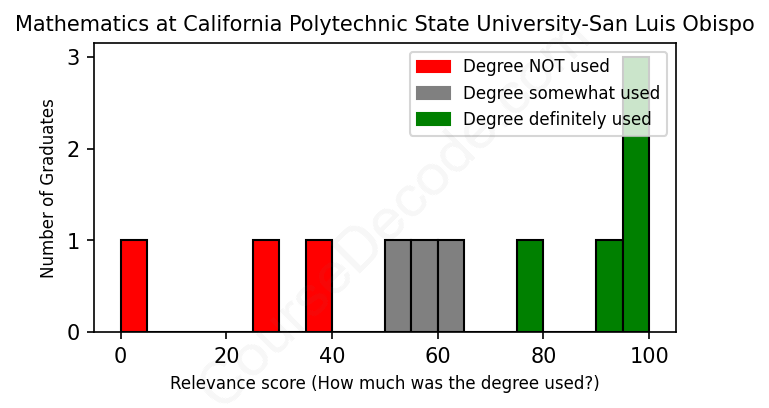
First, some facts. Of the Mathematics graduates from California Polytechnic State University-San Luis Obispo we've analyzed , here's how many have used (or NOT used) their degree in their career:

These are estimates based on AI analysis of 11 LinkedIn profiles (see below).
The verdict? Slightly below average. Overall, with an average relevance score of 64%, Mathematics graduates from California Polytechnic State University-San Luis Obispo have a slightly lower likelihood (-3%) of finding work in this field compared to the average graduate across all fields:
And for comparison, here's the chart for all profiles we've looked at across all degrees.
Also, after graduating, only 27% of these graduates have pursued further education other than another Bachelor's degree (such as a Masters degree or other), compared to the average across all profiles of 35%. This suggests a Bachelors degree is enough for most Mathematics graduates, and it's normal to look for work straight after graduation.
See the details:
|
Relevance score: 100% We think this person has gone into a career highly relevant to their degree. We think this person has gone into a career highly relevant to their degree.
DEGREE INFOGraduated in 2015 from California Polytechnic State University-San Luis Obispo with a Bachelor of Science (B.S.) in Mathematics. Also pursued further education since (see below). JOB HISTORY SINCE GRADUATIONResearch Assistant California Polytechnic State University-San Luis Obispo Jun 2015 - Aug 2015 Financial Analyst Internship  Rabobank N.A. Jun 2016 - Sep 2016 Lecturer  California Polytechnic State University-San Luis Obispo Sep 2017 - Aug 2019 FURTHER DEGREES DONE SINCE GRADUATINGMaster of Science (M.S.)California Polytechnic State University-San Luis Obispo 2015 - 2017 Doctor of Philosophy - PhD The University of Alabama 2019 - 2024 ABOUTSeeking employment teaching mathematics at the post secondary education level. I have experience teaching classes ranging from remedial college math through the calculus sequences and differential equations. My experience in research has fostered a number of potential undergraduate projects. I have proficiencies in Python, Latex, Mathematica, and all Microsoft Office environments. |
The top 10 most common jobs done by the graduates we've analyzed (ranked most common to least) are:
When looking at the career paths of California Polytechnic State University-San Luis Obispo graduates with a Mathematics degree, it seems like a solid chunk of them have gravitated toward education and analytical roles. Positions like Teaching Associates, Math Lecturers, and various educator roles make up a significant part of the scene, highlighting the value of mathematical knowledge in teaching. On the other hand, many grads have also jumped into consulting and data analysis jobs, like at CGI and Care2, where they apply some math skills, but their roles don't always require a deep mathematical understanding. It varies – some use their math skills directly, while others lean on more general analytical skills flavored by their math background.
However, not every job is an obvious fit. Some roles, like those in administration or customer service, don’t really call for the mathematical expertise that their degree offers. For instance, jobs like Front Office Receptionist or Kitchen Assistant have little to do with math. This trend shows that while a Mathematics degree can open doors to numerous interesting careers, many graduates find themselves in positions where they might not fully leverage their advanced mathematical skills. Overall, it seems that while many Mathematics graduates do end up in relevant roles, the relevance can vary significantly based on the specific job and industry they pursue.
Here is a visual representation of the most common words in job titles for Mathematics graduates (this is across all Mathematics graduates we've analyzed, not just those who went to California Polytechnic State University-San Luis Obispo):

When you check out the career paths of Mathematics graduates from California Polytechnic State University-San Luis Obispo, there's a pretty mixed bag of outcomes. Right after graduation, many of these folks land in relatively relevant roles—like teaching positions or internships that tie back to their math skills. For instance, it’s common to see recent grads stepping into data analyst roles or education-related jobs, which shows that a degree in math can lead you into practical applications of your studies pretty quickly. It's cool to see some going for consultant roles too, especially in tech and finance, which really value that analytical mindset.
However, as you look at their trajectories five to ten years down the line, it starts to vary a bit more. Some people have climbed up the ladder in consulting or academia, becoming instructors or even directors, which is great! But then you've got others who have drifted into roles that seem less connected to their math background, like administrative positions or customer service roles, which might make you wonder if they fully utilized their degree. So, while a fair amount of these grads find solid careers that leverage their math skills, there’s definitely a trend where a chunk end up in careers that don’t seem to tap into the full potential of what they studied. It’s a mixed bag, but it also shows that math can open a lot of doors, even if some people don’t walk through the ones that connect directly to their major.
Getting a Bachelor's degree in Mathematics at California Polytechnic State University-San Luis Obispo, or really anywhere else, can be pretty challenging. Math majors dive deep into complex concepts and problem-solving, and you're definitely going to be putting in some serious study hours. While some students might find certain classes easier than others, in general, math programs are known for being rigorous and demanding, especially with proofs and abstract theories. So if you like a good challenge and enjoy problem-solving, you might find it rewarding. But if you're not super into math or struggle with it, be prepared for a tough road ahead!
Most commonly, in the LinkedIn profiles we've looked at, it takes people 4 years to finish a Bachelor degree in Mathematics.
So, looking at the job histories of these Cal Poly Math grads, it seems like they’re on a pretty mixed financial journey. The older graduates, especially those who moved into consulting or academic roles, likely earn decent salaries, particularly the ones who climbed ranks at CGI or became professors. But then you have some recent grads who started with smaller roles, like receptionists and teaching positions, which typically don’t pay as much. Overall, while some of them are probably doing well, especially if they’re in high-demand fields like data analysis or consulting, others might be still figuring things out with more entry-level jobs. It’s a bit of a mixed bag, but the potential for decent money is definitely there, especially as they gain experience!
Here is a visual representation of the most common words seen in the "about" section of LinkedIn profiles who have a Bachelor degree in Mathematics (this is across all Mathematics graduates we've analyzed, not just those who went to California Polytechnic State University-San Luis Obispo). This may or may not be useful:

Here are all colleges offering a Bachelor degree in Mathematics (ordered by the average relevance score of their Mathematics graduates, best to worst) where we have analyzed at least 10 of their graduates:
| College | Score | Count |
|---|---|---|
 University of Florida University of Florida
|
83 | 11 |
 Penn State University Penn State University
|
74 | 13 |
 The University of Texas at Austin The University of Texas at Austin
|
68 | 23 |
 University of Washington University of Washington
|
68 | 27 |
 University of California, Berkeley University of California, Berkeley
|
66 | 10 |
 University of Minnesota-Twin Cities University of Minnesota-Twin Cities
|
65 | 15 |
 California Polytechnic State University-San Luis Obispo California Polytechnic State University-San Luis Obispo
|
64 | 11 |
 University of North Texas University of North Texas
|
51 | 11 |
 University of California, Riverside University of California, Riverside
|
44 | 11 |